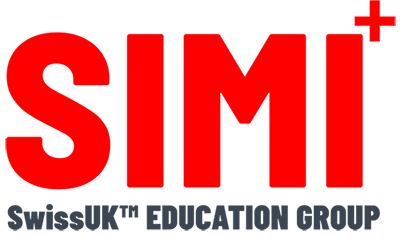RECOGNITIONPRIVATE DEGREE
of Switzerland
SWITZERLANDHigher Education
System
The Swiss higher education system operates without a centralized educational authority; there is no single Ministry of Education overseeing the entire nation’s educational framework. Instead, education in Switzerland is primarily managed at the cantonal (state) level, involving both public and private educational institutions that adhere to principles of autonomy and competition.
1. Diversity of Higher Education Institutions
While higher education in Switzerland is primarily dispensed by public institutions, there are also many private ones. Some of these private institutions cater primarily to Swiss clients. As such, they are part of Switzerland’s public higher education sector and therefore receive public subsidies. Other private institutions were created mainly for the purpose of servicing international students and are not part of Switzerland’s public higher education sector. Between these two extremes, there are situations that combine both realities and in some cases the same institution may even offer separate curricula to address the needs of both the Swiss and international markets.
2. High Degree of Autonomy and Oversight Mechanisms
As a general rule, in Switzerland no prior authorisation is required in order to offer higher education courses, organise examinations or issue private degrees. In certain cases, however, the federal or cantonal authorities, depending on their respective area of authority, will supervise private institutions and/or authorise them to offer courses and issue degrees. This supervision means that private institutions are required to accept a certain amount of public control. They must undergo quality inspections if they wish to issue protected titles that will be recognised as such. Non protected titles are nevertheless common.
3. Private Higher Education and Quality Assessment Mechanisms
Private higher education institutions that are not part of Switzerland’s public education system, are not fully supervised by public authorities, or are classified as higher education institutes or schools of higher education do not necessarily offer lower-quality education. In fact, many reputable private institutions in Switzerland operate entirely independently from the public sector while maintaining high teaching standards. Swiss educational tradition emphasizes the role of the labor market and learners in assessing the quality of higher education institutions rather than relying on state intervention.
Conclusion:
The Swiss higher education system operates based on principles of autonomy, competition, and flexibility, allowing both public and private institutions to coexist without centralized control from a single Ministry of Education. Instead of being strictly regulated by the state, educational institutions—particularly private higher education institutes and schools—are evaluated by the market and learners based on the actual quality of their programs and the value of their degrees. The absence of centralized management and the limitation of state intervention promote competition, prevent protectionist mechanisms, and ensure fairness in the selection of educational programs. Switzerland upholds the right to self-determination and access to education for all citizens, fostering diversity and flexibility within its education system.
References:
Federal Department of Economic Affairs, Education and Research (EAER), State Secretariat for Education, Research and Innovation (SERI) Directorate: Validity of Degrees Issued by Private Higher Education Institutions in Switzerland – Office Circular.
The accreditation system for Switzerland’s higher education sector (tertiary level according to the ISCED-97 classification) is regulated under the Federal Act on Funding and Coordination of the Higher Education Sector (HEdA, SR 414.20), which came into effect on January 1, 2015. According to this regulation:
- With HEdA, designations such as “university,” “university of applied sciences,” “university of teacher education,” and derived designations such as “university college” or “UAS college” can only be used by public or private institutions that have been institutionally accredited by the Swiss Accreditation Council. This regulation also applies to designations in languages other than Switzerland’s national languages.
- Other designations such as “academy”, “school”, “institute”, etc. remain unreserved and do not require accreditation.
- In case where institutions do not fall within the scope of HEdA, it is up to the cantons to prepare corresponding guidelines and establish additional rules and recognition procedures for these institutions.
References:
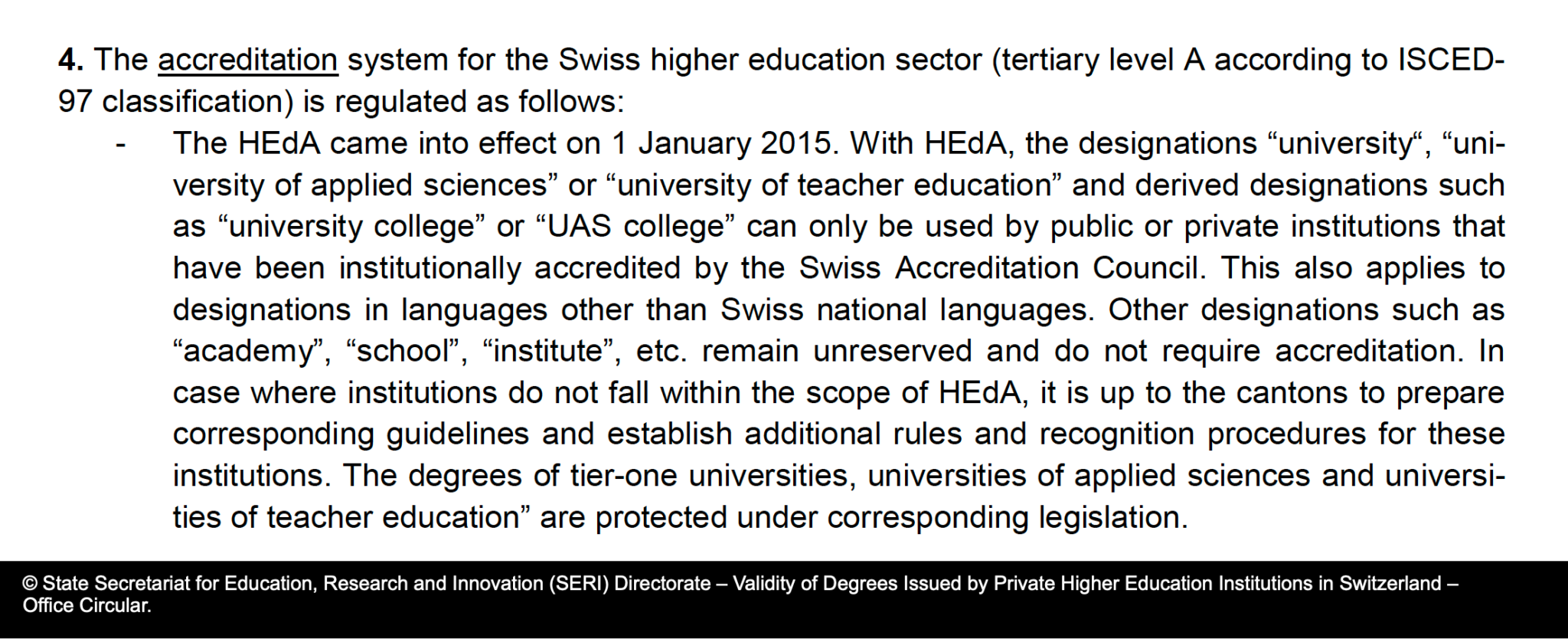
Question: Does every higher education institution in Switzerland have to be accredited?
In Switzerland, a higher education institution must be accredited in accordance with the Higher Education Act (HEdA) (Article 29) if it wishes to use a protected name such as «university», «university of applied sciences» or «university of teacher education» in a national language or in another language. This also applies to versions derived from it, such as «tier-one colleges» or «UAS colleges». On the other hand, terms such as «higher education institute», «business school» or similar are not protected by federal law. On the other hand, it may be that cantonal law is more restrictive than federal law. In this case, the canton where the respective university is located can provide you with further information.
Source: Swiss Accreditation Council; excerpt from the FAQ section [See more]

Question: Why are not all higher education institutions in Switzerland accredited?
Private higher education institutions that do not wish to make use of the right to use reserved designations under Article 29 of the Higher Education Act (HEdA) do not have to be accredited. However, according to Article 2 HEdA, all public higher education institutions – i.e., federal and cantonal higher education institutions – must be accredited.
Source: Swiss Accreditation Council; excerpt from the FAQ section [See more]

Question: What is the value of institutional accreditation for higher education graduates in terms of acceptance in the professional world and admission to other higher education institutions at national and international level?
Accreditation is not directly related to the acceptance of graduates in the world of work. However, accreditation plays a greater role in admission to other national and international higher education institutions.
Source: Swiss Accreditation Council; excerpt from the FAQ section [See more]

Question: I want to study at an institution that is not institutionally accredited – should I assume that it is of poor quality?
No, this conclusion cannot be drawn in this way.
Source: Swiss Accreditation Council; excerpt from the FAQ section [See more]

As far as recognition of Swiss HEI qualifications are concerned:
- Federal or cantonal legislation determines which degrees are recognised for regulated professions (e.g. medical practitioners, lawyers, etc.). Generally speaking, only HEIs recognised by virtue of federal legislation issue such degrees. Only in very rare cases (e.g. theology) are degrees for regulated professions issued by private institutions.
- For unregulated professions (e.g. managers, journalists, etc.), it is up to employers to decide whether to “recognise” the value of a degree; however, these degrees have more weight if they obtain accreditation or certification of quality issued by generally recognised private bodies.
- As far as admission to a higher level of studies is concerned, it is up to the HEI to decide whether to recognise the value of the prospective student’s prior qualifications. As with the recognition of foreign qualifications from countries with which Switzerland has no corresponding international agreement, the HEI relies on recommendations made by Swiss ENIC, which acts under a mandate from the State Secretariat for Education, Research and Innovation (SERI)
References:
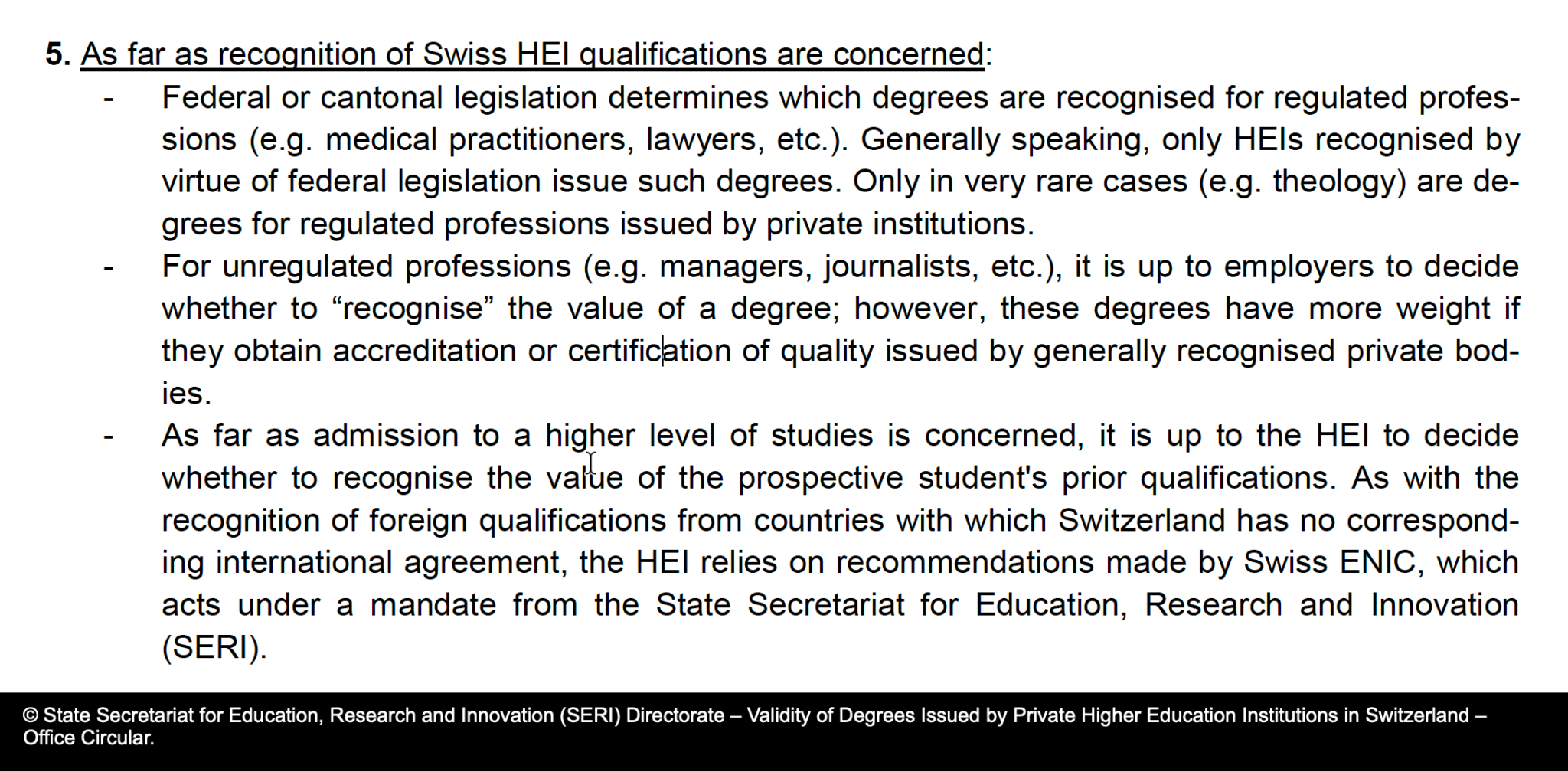
Private institutions based in Switzerland that are not accredited under the HEdA may only issue private degrees. Such degrees:
- generally do not confer any entitlement upon the holder to gain direct access to a higher level of studies within Switzerland’s public higher education sector; (Regarding admission to higher education levels, higher education institutions have full authority to decide on the recognition of the value of an applicant’s previous qualifications).
- generally may not be used by the holder to carry out a profession that is regulated in Switzerland. For this group of disciplines, private institutions typically do not offer training or issue degrees; (SIMI, as a private higher education institution in Switzerland, does not offer programs in this category.)
- may be used by the holder to carry out an unregulated profession; appreciation of the value of private degrees is left up to employers.
References:

In Switzerland, professions can be broadly classified into regulated and non-regulated professions. Understanding the difference between these two groups is crucial for both Swiss citizens and international professionals intending to work in Switzerland.
Regulated Professions (Require Licensing & Certification)
Definition:
Regulated professions are those that require specific degrees and certifications as mandated by law to practice. These professions are typically supervised by professional bodies or government authorities.
Examples:
- Healthcare: Doctors, nurses, pharmacists, and other medical professionals must meet strict educational and certification requirements.
Law: Lawyers and notaries must be recognized by the bar association and meet specific education criteria. - Engineering & Architecture: Some engineering and architectural fields require certification from recognized professional bodies.
- Finance: Certain financial roles, such as auditors and accountants, may require certification from accredited institutions.
Requirements:
- Degree: A specific academic qualification, vocational training, and, in some cases, additional exams.
- Certification: Registration with a professional body and compliance with continuous professional development requirements.
- License: An official practice license, often requiring periodic renewal.
Non-Regulated Professions (No Licensing Required)
Definition:
Non-regulated professions do not require specific legal recognition or a professional license to practice.
Examples:
- Management: Roles such as CEOs, HR Directors, and Business Managers.
- Journalism: Reporters and media professionals.
- Information Technology: Software developers, IT consultants, and network administrators.
- Marketing & Sales: Marketing specialists, sales representatives, and business development experts.
- Creative Industries: Graphic designers, artists, writers, and media professionals.
- Hospitality & Tourism: Hotel managers, tour operators, and restaurant managers.
Requirements:
- Degree & Certification: While not legally required, relevant degrees and professional certifications can improve job prospects.
- Experience: Practical experience and a strong portfolio are often valued by employers.
- Skills: Industry-specific skills and competencies are essential for career success.
Key Differences:
Legal Requirements:
- Regulated Professions: Require specific degrees and certifications as mandated by law.
- Non-Regulated Professions: No legal restrictions, but degrees can enhance employment opportunities.
Supervision:
- Regulated Professions: Overseen by professional bodies and government authorities.
- Non-Regulated Professions: No formal supervision, but industry standards and employer preferences apply.
Mobility and Recognition:
- Regulated Professions: Foreign degrees may require assessment and equivalency recognition.
- Non-Regulated Professions: More flexibility, as degrees and experience are often transferable.
SIMI Swiss Programs for Non-Regulated Professions
- SIMI Swiss is a private higher education institution located in Zug, Switzerland. It offers single-degree programs (degrees solely awarded by SIMI) in non-regulated professions.
- These programs allow graduates to work in various fields, including management roles such as CEO, HR Director, and Principal (Head of an educational institution).
SIMI Swiss Programs for Regulated Professions (If Applicable)
SIMI Swiss only provides programs for regulated professions through partnerships with other universities.
Through dual-degree programs and mutual recognition agreements with partner universities, students earn a dual degree. With the second degree from the partner university, students may enhance their eligibility for regulated professions (if required).
Reference:
To determine whether a profession requires a license or additional certification before practicing in Switzerland, follow these steps:
1. Check with Federal Authorities
- Visit the website of the State Secretariat for Education, Research, and Innovation (SERI), which provides information on the recognition of foreign qualifications and regulated professions in Switzerland.
- Website: SERI Official Site
2. Identify Whether the Profession is Regulated
- Regulated professions require specific degrees or licenses to practice, such as those in healthcare, law, specialized teaching (early childhood, special education), or engineering.
- Non-regulated professions may not require formal recognition but can be subject to industry-specific standards.
3. Consult the Professional Registers
Certain professions have specialized regulatory bodies or professional registers in Switzerland. Examples include:
- Doctors: Swiss Medical Association (FMH)
- Architects: REG A and REG B Registers
- Teachers: Swiss Conference of Cantonal Ministers of Education (EDK)
4. Contact Cantonal Authorities
- Licensing requirements may vary by canton in Switzerland. Contact the relevant cantonal office to confirm specific requirements for your profession.
5. Consider International Degree Recognition
- If you have a foreign degree, check whether it is recognized in Switzerland. SERI provides detailed guidance on the recognition process and required steps.
6. Seek Professional Advice
- For complex cases, consider consulting a lawyer or career advisor specializing in Swiss labor law and professional licensing.
This video offers a better understanding of professions and industries requiring additional licensing to work in Switzerland [HERE]
INTRODUCTIONPrivate Degree of Swiss HEIs
In Switzerland, a private degree refers to an academic qualification awarded by private higher education institutions rather than public universities. These institutions operate independently of the state system and are legally entitled to offer a full range of programs—bachelor’s, master’s, and doctoral degrees. Unlike public universities, private institutions are not bound by federal regulation, which allows them greater flexibility in designing curricula, adopting innovative teaching methods, and tailoring programs to industry needs and student expectations.
Students often choose private degrees for their specialized education, smaller class sizes, and personalized learning experiences. Many private institutions also build strong partnerships with industry, giving students access to practical training, applied skills, and valuable professional networks that enhance employability. However, the accreditation and recognition of private degrees vary, making it essential for prospective students to carefully evaluate whether a qualification is accepted by employers, professional bodies, or other universities.
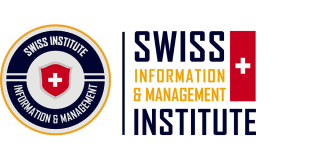
The State Secretariat for Education, Research, and Innovation (SERI) has provided clear guidelines confirming that private institutions in Switzerland may legally operate outside the public university system, with recognition depending largely on international accreditations and acceptance by receiving institutions.
Within this landscape, SIMI Swiss stands out as more than a local private school. As Switzerland’s Truly International™ higher education institute, SIMI is dedicated to educating global students. Our programs combine the excellence of Swiss private education with recognition from the UK Government system. Every program awards dual qualifications—one Swiss private degree and one UK-Gov recognized qualification—ensuring that students benefit from both world-class academic quality and global recognition of their credentials.
SWISS PRIVATE DEGREERecognition
Status & Distinction
ACCREDITEDSIMI Swiss Current Accreditation
INSTITUTIONAL LEVELASIC United Kingdom
PROGRAMATIC LEVELOTHM United Kingdom
PROGRAMATIC LEVELQUALIFI United Kingdom
Multi Recognized
University Partners
Help learners save on tuition fees and maximize the value of their degrees through recognition by both SIMI Swiss and its university partners.
FEDERAL STATUSBecome Swiss University 2027
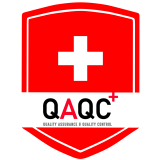
SIMI Swiss is actively preparing to seek accreditation from the Swiss Agency of Accreditation and Quality Assurance (AAQ), which is approved by the Swiss Accreditation Council (SAC), by 2027.

FEDERAL STATUSBecome Swiss University 2027
SIMI Swiss is actively preparing to seek accreditation from the Swiss Agency of Accreditation and Quality Assurance (AAQ), which is approved by the Swiss Accreditation Council (SAC), by 2027.


